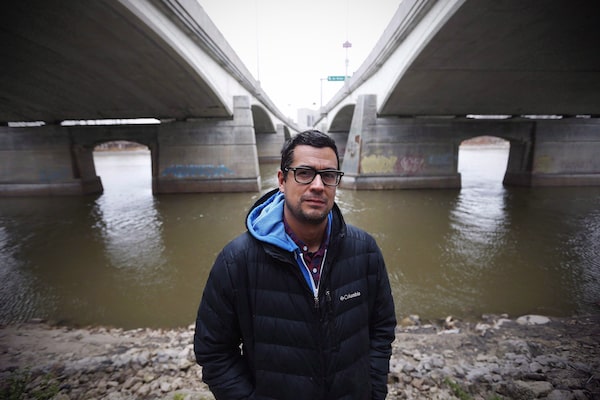
David Alexander Robertson, author of Betty: The Helen Betty Osborne Story, beside Winnipeg's Red River on Nov. 11, 2015.JOHN WOODS/The Canadian Press
David Alexander Robertson comes from a long line of storytellers.
In fact, when the Winnipeg writer and member of the Norway House Cree Nation began writing, it felt like something he was born to do.
“Storytelling is something that my family, my ancestors on my Indigenous side, have been doing for a long time,” he says. “Writing stories is honouring those traditions and finding different ways to carry on that tradition. We’re just finding new ways to do the same thing that we’ve always done.”
Robertson is part of an Indigenous renaissance in Canadian literature. On any given week national bestseller lists are populated in no small part by First Nations, Inuit and Metis writers. Among them: Michelle Good, whose novel Five Little Indians has made regular appearances on Canadian fiction lists since its release in 2020, Cherie Dimaline, whose novel The Marrow Thieves has been a top seller on and off since it debuted in 2017, and Robertson’s recently released first novel for adults, The Theory of Crows.
The author of 25 books, mostly graphic novels and young adult fare, Robertson says he tries to educate others through his work.
“I think that’s what stories do, they teach you things and that gift of knowledge is something that helps motivate change,” he says. “And that’s why I focus mostly on children and youth because they have the greatest capacity for change.”
Learning each other’s stories, recognizing the similarities and respecting the differences, is the life blood of reconciliation, he says.
“Reconciliation doesn’t happen without truth and truth comes from stories. We are nowhere on this path toward reconciliation without stories,” he says.
His hope is that the National Day for Truth and Reconciliation motivates Canadians to learn every day and to think about their own roles and what they can do on that path.
“It’s a long path and we’re on it for the long haul, hopefully,” he says.
Brian Thomas Isaac, whose debut novel, All The Quiet Places, was longlisted for this year’s Scotiabank Giller Prize, will spend the federally recognized day with his wife at their home near Falkland, B.C. While Isaac had cousins who attended residential school, his mother sent Isaac, a member of the Okanagan Indian Band, to the public school in nearby Falkland.
“I have been asked questions about residential schools many times and I just prefer not to answer because I’m not qualified to speak about it,” he says.
He can, though, speak to the rise of Indigenous storytelling, having released his debut novel at age 71, which was also a finalist for the Amazon Canada First Novel Award and named an Indigo best book of the year.
“To me, the rise of Indigenous storytelling might be better called the rise of non-Indigenous people paying attention and listening to the stories,” he says. “Now that Indigenous people have been writing and becoming published, there are more and more people who want to read it.”
Like Robertson, Isaac grew up surrounded by storytellers. In his case, his uncles were the primary entertainment in a home where there was no TV, no power and no indoor plumbing.
A self-taught writer and voracious reader who left school in Grade 8 (“I could get by in school but I couldn’t get by the racism on the school buses. I felt like I was all alone and fighting everybody myself.”), Isaac says there has been a slow but steady increase in Indigenous literature since the wildly successful novel Monkey Beach by Eden Robinson was published in 2000. Yet he still struggled to find a publisher for his novel.
Indigenous stories have always been there but the opportunities for publication have not, he says. That is changing in many countries and there is a common thread, he adds.
“What New Zealand, Australia, American, and Canadian Indigenous writers have in common is the experience of being colonized and we all write about it because it is from our own personal experience.”
Isaac and Robertson will be among several Indigenous writers featured at this year’s Vancouver Writers Fest, alongside Joshua Whitehead (Jonny Appleseed), Billy-Ray Belcourt (A Minor Chorus), a virtual Buffy Sainte-Marie, Brandi Morin (Our Voice of Fire), and poet Jónína Kirton (Standing in a River of Time). The rise of Indigenous storytelling will be one of the many themes of 80 events in the city from Oct. 17 to 23.
“There is a great expanse of Indigenous authors publishing these days … and a great amount of our programming is going to be devoted to Indigenous writing,” says Leslie Hurtig, artistic director.
The event partners for several of the events on the program with the Talking Stick Festival, an annual summer celebration of First Nations art and culture.
The 35th instalment of the festival will return to a full in-person program after going virtual all or in part for the past two years. This will include The Power of Story, a live recording of CBC’s The Next Chapter featuring Robertson, Isaac and The Globe and Mail’s Marsha Lederman (Kiss the Red Stairs: The Holocaust, Once Removed).
“Books help us to walk in the shoes of others and build community and the more voices that we can represent at the festival, and the more ideas and learning that we can have on our stages, the better off our community is for it,” Hurtig says.
Expand your mind and build your reading list with the Books newsletter. Sign up today.